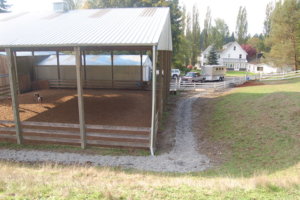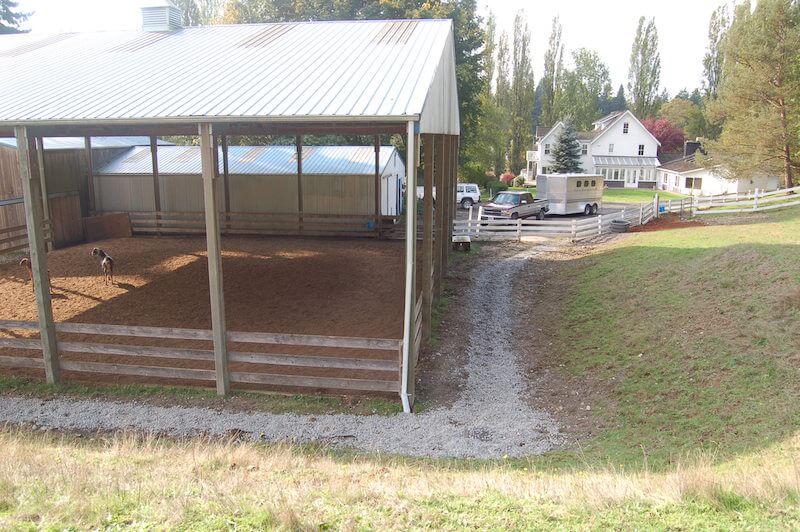Dealing with Drainage Issues in the Pacific Northwest
by Alayne Blickle, Horses for Clean Water

Managing the wet environment in the Pacific Northwest can be challenging. During winter excessive rain fall makes mud, an especially unpleasant reality for many horse owners. Mud is not just a nuisance; it creates an unhealthy environment for horses. Mud harbors bacteria, fungal organisms and other pathogens that cause abscesses, scratches, rain scald and thrush. The effects of repeated wet/dry conditions are damaging to hoof structure and can cause general unthriftiness. Mud is a breeding ground for insects, such as cullicoides (“no-see-ums”), filth flies and mosquitoes. Insects are not only annoying; they can carry diseases and can cause allergic reactions. When fed on muddy ground, horses can ingest dirt or sand particles with hay, leading to sand colic, a very serious digestive order. Plus, mud creates a slick, unsafe footing, increasing the risk of injury (for horses and humans).
Besides the health issues for horses, every horse person knows that muddy conditions make every day chores difficult. Flies and the appearance of mud also lowers the desirability of a property for customers and neighbors. Mud wreaks havoc on surrounding areas as well, muddying precious water sources. Once soil and manure has mixed with water to make mud, it can easily be carried into nearby streams or lakes. Sediment can smother trout and salmon eggs, destroy habitat for insects (a food source for fish) and cover prime spawning areas. Many pollutants, like the nutrients in manure, are also likely to attach to soil particles and be carried into the water.
What You Can Do – Direct and Slow the Flow
There are several ways to manage mud and the primary principle is to direct and slow the flow. If you already have gutters and downspouts on barns and out-buildings and footing in confinement areas but rain is still flowing into confinement areas you may need to consider installing some type of drainage system to divert away surface water flowing towards your barn. When tackling drainage think “slow the flow.” The best and easiest way to reduce surface water is to slow it down. Many times just slowing water down will allow it to infiltrate back into the ground–perhaps all that’s needed to solve a drainage issue. This also helps recharge the natural hydrology of your property including ground water.
Each of these techniques can be useful for keeping clean rainwater out of your paddock and reducing mud:
- French drain lines
- Diversion ditches
- Water bars (like a speed bump for water runoff)
- Swales (gently sloping depressions or grass-lined waterways)
- Dry wells
Divert the clean surface water away from your high traffic areas to someplace else on your property where it can soak back into the ground. Possibilities include an unused corner of your pasture, a section of woods, a grassy swale or other well-vegetated areas. Never divert to an existing water body as the amount of added water can drastically and unnaturally change water levels. When water levels go up quickly, that increases turbidity and important fish habitat is often ruined or destroyed.
Upcoming Presentations and Workshops
SAN JUAN ISLANDS, WA
April 19th , San Juan Island, 5 pm to 8 pm
WORKSHOP: Growing Great Grass – Pasture Management Techniques to Increase Production for Horses and Livestock and Prevent Weeds and Mud!
April 20th, Orcas Island, 2 pm to 4 pm
WORKSHOP: Growing Great Grass — Pasture Management Techniques to Increase Production for Horses and Livestock and Prevent Weeds and Mud.
April 20th, San Juan Island, 9 am to 11 am, $10 for non-SJICD staff
WORKSHOP: Creating Success in Your Small Farm Education Program.
d.kinsey@sanjuanislandscd.org or 360.378.6621
AUBURN , WA
April 21, 1 pm to 3 pm
WORKSHOP: Innovations in Confinement Area Horse Keeping – Track Paddocks, Trail Courses, Slow Feeders and More! 425-282-1949 or signup@kingcd.org.
NAMPA, ID
April 23, 7pm, Fleet Reserve Building, 1012 11th Ave North, Nampa, ID
PRESENTATION: Fire-wise on Horse Properties
Alayne@horsesforcleanwater.com
Published April 2013 Issue

Alayne Blickle, a life-long equestrian and educator, is the creator/director of Horses for Clean Water, an award-winning, nationally acclaimed environmental education program that “wrote the book” on caring for horses and land. Known for her enthusiastic, fun and down-to-earth approach, she is an educator and photojournalist who has worked with horses and livestock owners for over 20 years. Alayne teaches and travels throughout North America and abroad, and also runs Sweet Pepper Ranch, an eco-sensitive guest ranch and horse motel in Southwestern Idaho where she and her husband raise top-notch reining horses and beautiful grass hay. For more information contact Alayne at alayne@horsesforcleanwater.com or 206-909-0225.

